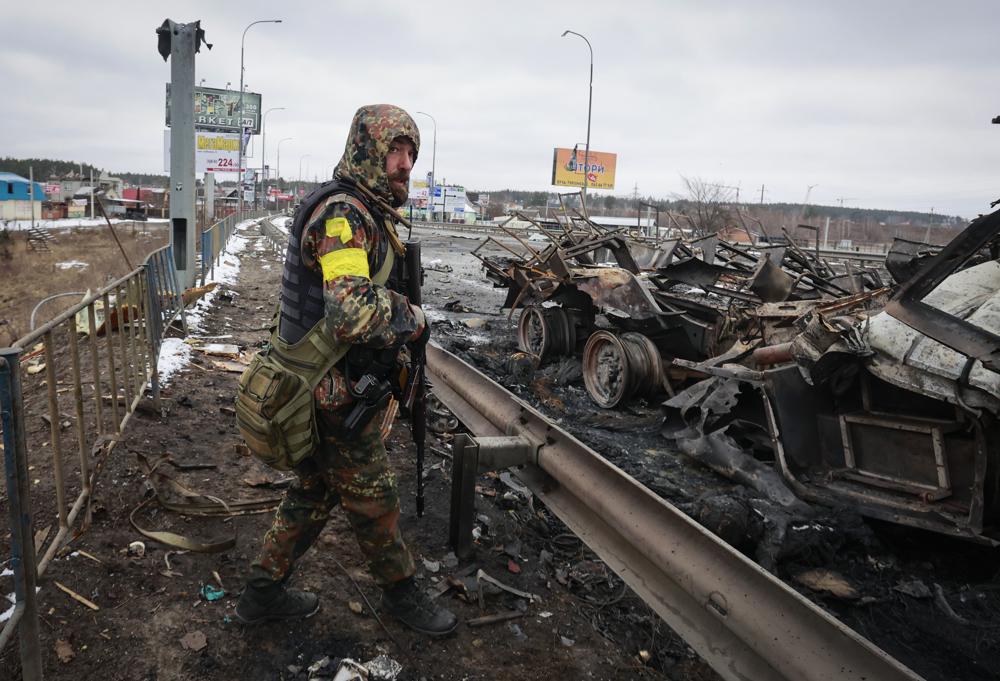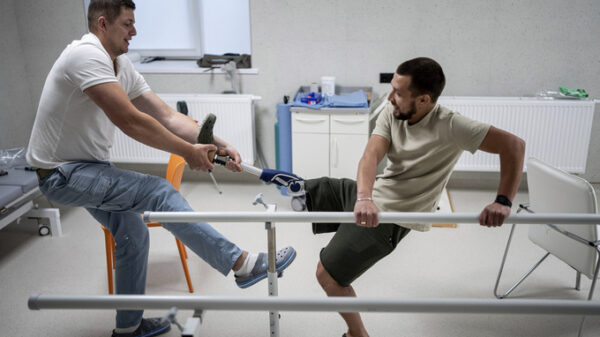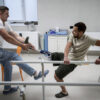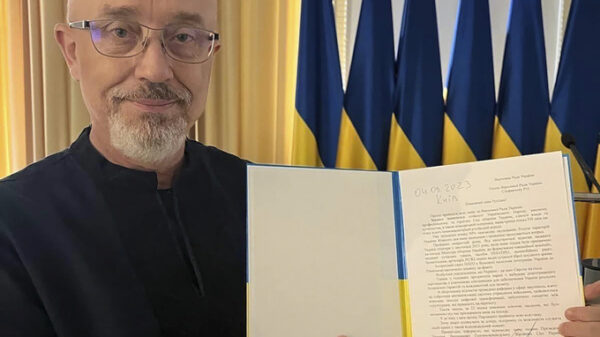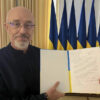FILE – An armed man stands by the remains of a Russian military vehicle in Bucha, close to the capital Kyiv, Ukraine, March 1, 2022. (AP Photo/Serhii Nuzhnenko, File)
WASHINGTON (AP) — Two weeks into its war in Ukraine, Russia has achieved less and struggled more than anticipated at the outset of the biggest land conflict in Europe since World War II. But the invading force of more than 150,000 troops retains large and possibly decisive advantages in firepower as they bear down on key cities.
Moscow’s main objective — toppling the Kyiv government and replacing it with Kremlin-friendly leadership — remains elusive, and its overall offensive has been slowed by an array of failings, including a lack of coordination between air and ground forces and an inability to fully dominate Ukraine’s skies.
The Pentagon on Tuesday estimated that Russia retains about 95% of the combat power it has deployed in Ukraine, accounting for weapons and vehicles destroyed or made inoperable as well as troops killed and wounded. Those losses, while modest at first glance, are significant for two weeks of fighting.
Two weeks of war have created a humanitarian crisis in Ukraine that has accelerated in recent days. The United Nations estimates that 2 million Ukrainians have fled their country, and the number is expected to grow.
Russia likely has had between 2,000 and 4,000 troops killed thus far, said Lt. Gen. Scott Berrier, director of the Defense Intelligence Agency, adding that his agency has “low confidence” in its estimate.
With no sign of Russian President Vladimir Putin backing away, the war appears likely to drag on. CIA Director William Burns told a congressional panel Tuesday that Putin is frustrated and likely to “double down” in Ukraine. He said that could mean “an ugly next few weeks” as the fighting intensifies.
Whether and how the conflict might expand is a major concern in the West, not least because Putin has said he will not tolerate unlimited U.S. or NATO arms supplies to Ukraine. NATO in turn has warned against the Russian conflict spilling over Ukraine’s border into a NATO country like Poland or Romania. Poland on Tuesday offered to transfer MiG-29 fighter jets to U.S. control at an air base in Germany, presumably leaving to Washington the question of whether and how to get the planes to Ukraine. The Pentagon quickly shot down the idea, calling it untenable in light of Ukraine’s contested airspace.
Some worry that a frustrated Putin could escalate the conflict in dangerous ways. A few days into the war, he invoked the prospect of nuclear war by announcing he had put his nuclear forces on heightened alert, although U.S. officials detected no threatening changes in Russia’s nuclear posture.
“As he weighs an escalation of the conflict, Putin probably still remains confident that Russia can militarily defeat Ukraine and wants to prevent Western support from tipping the balance and forcing a conflict with NATO,” Avril Haines, the director of national intelligence, told Congress on Tuesday.
Although a detailed picture of the unfolding war is difficult to acquire, American and European officials and analysts say the Russians started slowly and have since been hobbled by a combination of inadequate planning, flawed tactics and possibly an erosion of spirit among troops not ready to fight.
On the opening day of the war, the Pentagon estimated that only about one-third of pre-staged Russian combat forces had entered Ukraine, with the remaining two-thirds coming in gradually until nearly all were in this week. The Russian troops have made incremental progress, but their pace has been remarkably slow.
“They are having morale problems,” said John Kirby, the Pentagon’s chief spokesman. “They are having supply problems. They are having fuel problems. They’re having food problems. They are meeting a very stiff and determined Ukrainian resistance. And we still maintain that they are several days behind what they probably thought they were going to be in terms of their progress.”
Kirby said the Pentagon believes that the Russians’ slow pace of advance by ground troops has prompted them to make greater use of rockets, artillery and other long-range weapons, including in urban areas. That has resulted in more civilian casualties, he said.
“We think it’s because, again, they have not been able to make up for the lost time that they continue to suffer from on the ground in terms of the advancement of ground forces,” Kirby said.
After staging more than 150,000 troops on Ukraine’s borders, the Russians launched their invasion Feb. 24, pressing south toward Kyiv from points in southern Belarus and Russia; toward Kharkiv, the largest city in eastern Ukraine, and north from the Crimean peninsula, which Russia has occupied since 2014.
Ukrainians mounted a fiercer resistance than Putin likely expected, even as Russian missile and rocket attacks on cities have caused civilian casualties, damaged and destroyed civilian infrastructure and triggered an accelerating exodus of refugees seeking safety in Poland and beyond.
Jens Stoltenberg, the NATO secretary-general, said Friday that Russia may have underestimated the degree to which Ukraine’s armed forces had improved since 2014 as a result of U.S. and NATO training.
“And this is the reason why they are able to push back” as effectively as they have, Stoltenberg said.
Philip Breedlove, a retired Air Force general who was NATO’s top commander in Europe from 2013 to 2016, said that although Russian forces are far behind schedule, he believes they are capable of eventually taking Kyiv.
“Unless there is a big operational-level change, they have enough of what I call slow, steady momentum that if they can stand the losses it will give them, they will eventually accomplish that objective,” he said. That raises questions about a Russian occupation and the potential for an insurgency.
Breedlove said the Russian offensive in southern Ukraine has been less bogged down than in the north and is designed to establish a “land bridge” between the southeastern Donbas region to the Crimean peninsula and west to the Black Sea port city of Odesa, which would make Ukraine a landlocked country.
Associated Press writers Lorne Cook in Brussels and Nomaan Merchant in Washington contributed to this report.
Copyright 2021 Associated Press. All rights reserved.





















